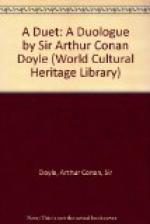It was a very much defaced inscription underneath a battered Elizabethan effigy, whose feet had been knocked off, and whose features were blurred into nothing. Two words of the inscription had caught Frank’s eye.
’Moestissima uxor! It was his “most sad wife” who erected it! Look at it now! The poor battered monument of a woman’s love. Now, Maude, come with me, and we shall visit the famous Poets’ Corner.’
What an assembly it would be if at some supreme day each man might stand forth from the portals of his tomb. Tennyson, the last and almost the greatest of that illustrious line, lay under the white slab upon the floor. Maude and Frank stood reverently beside it.
’"Sunset and evening Star
And one clear call for me."’
Frank quoted. ’What lines for a very old man to write! I should put him second only to Shakespeare had I the marshalling of them.’
‘I have read so little,’ said Maude.
’We will read it all together after next week. But it makes your reading so much more real and intimate when you have stood at the grave of the man who wrote. That’s Chaucer, the big tomb there. He is the father of British poetry. Here is Browning beside Tennyson— united in life and in death. He was the more profound thinker, but music and form are essential also.’
‘What a splendid face!’ cried Maude.
‘It is a bust to Longfellow, the American.’ They read the inscription. ’This bust was placed among the memorials of the poets of England by English admirers of an American poet.’
‘I am so glad to have seen that. I know his poems so well,’ said Maude.
‘I believe he is more read than any poet in England.’
‘Who is that standing figure?’
’It is Dryden. What a clever face, and what a modern type. Here is Walter Scott beside the door. How kindly and humorous his expression was! And see how high his head was from the ear to the crown. It was a great brain. There is Burns, the other famous Scot. Don’t you think there is a resemblance between the faces? And here are Dickens, and Thackeray, and Macaulay. I wonder whether, when Macaulay was writing his essays, he had a premonition that he would be buried in Westminster Abbey. He is continually alluding to the Abbey and its graves. I always think that we have a vague intuition as to what will occur to us in life.’
‘We can guess what is probable.’
’It amounts to more than that. I had an intuition that I should marry you from the first day that I saw you, and yet it did not seem probable. But deep down in my soul I knew that I should marry you.’
’I knew that I should marry you, Frank, or else that I should never marry at all.’
‘There now! We both had it. Well, that is really wonderful!’
They stood among the memorials of all those great people, marvelling at the mysteries of their own small lives. A voice at their elbows brought them back to the present.




